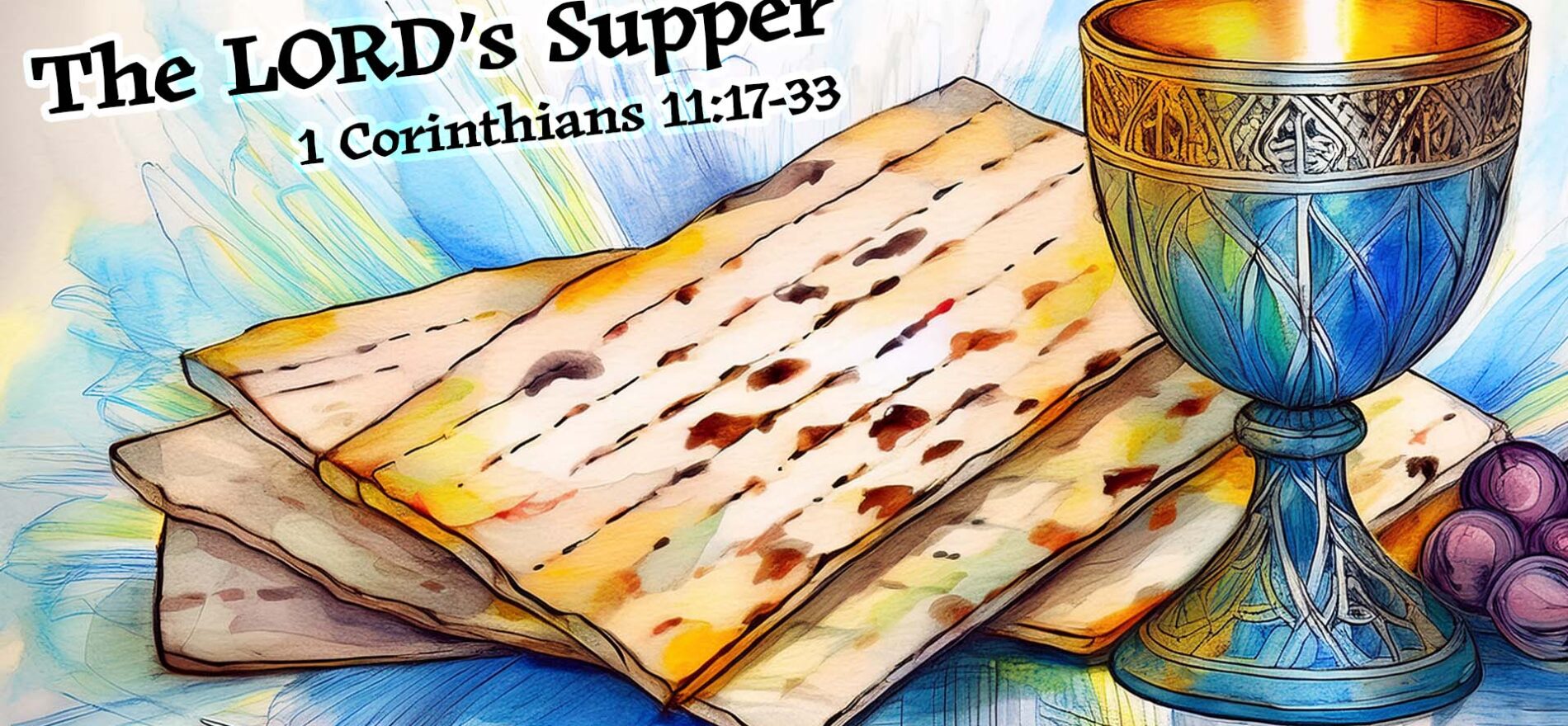[Transcript]
Moving on to the next matter, Paul quickly telegraphed his intentions. He was clearly displeased. The passage we’ll examine today has three movements. First, Paul identified the issue: factions and how they observed the Lord’s Supper. Second, he reminded them of what he had previously taught, including its meaning and significance. Lastly, he issued a warning along with his correction. The main point is the manner and spirit in which we should observe the Lord’s Supper, which should encourage each of us to examine our own hearts.
Despising the Church
“When you come together, it is not the Lord’s supper that you eat.” – 1 Corinthians 11:20
It may help to remember that, during this period in church history, most worship gatherings still occurred in the homes of wealthier believers who could host larger groups. According to Acts 18:7, when Paul shook out his garments in the synagogue, he then started holding church meetings at the house of Titius Justus, whose home was next to the synagogue. We can only assume that as their numbers increased, the number of homes where they met also grew.
With more people come more opportunities for problems, hence we are studying this corrective letter. Early in this letter, Paul drew prolonged attention to the divisions that appeared in his absence. Yet he mentions them here briefly, only to make an unfortunate but enlightening statement about them.
“For there must also be factions among you, that those who are approved may be recognized among you.” – 1 Corinthians 11:19 (NKJV)
The first time I read this statement, years ago, I didn’t know what to do with it. I didn’t have context for it. I hadn’t experienced church problems of any significant magnitude. But as I grew, and as I put more miles in on the narrow path, this verse’s significance began dawning on me. On the one hand, factions are bad. Division is a sign of immaturity within the congregation. And to be clear, not all disagreement is division. Disagreements are normal and, at minimum, a sign that people are reading the Bible and trying to figure things out. Division, however, typically means we’ve allowed disagreements to sour, and we’ve ceased to behave graciously with one another. I recognize that historically, not all divisions have been for bad reasons. Martin Luther’s parting of ways with the Roman Catholic church would be one example of healthy division. But the vast majority of the division, and the division that Paul addressed, was over petty, sinful things.
Division is bad. But also, division is useful. The part of the verse that always got me was that “there must be factions among you.” Must? Why? Because the Lord uses them to reveal the mature among us. I’m reminded that the Lord doesn’t waste anything. He uses all things to work out good for His people (Rom 8:28). I am persuaded that in every division that has ever formed within the Body of Christ, the Holy Spirit revealed who’s mature and who isn’t. Sometimes the mature are outnumbered and find somewhere else to worship. Other times, the mature endure and see the immature eventually fall away – not that they want to see that, but often times that is what happens. I’ve seen both happen, so I’m never quick to assume that when people leave, they’re behaving immaturely. They may be the mature ones who are far outnumbered.
But in the case of the early church, there was no leaving to worship elsewhere. There was one church. Perhaps the closest thing that would happen is you change houses to get away from whatever has happened. But you’re still in the same church with the same leaders who are aware of what has happened. Because of this, I’m also persuaded that Paul and the other Apostles never entertained the concept of “leaving” as an acceptable way to deal with conflict. The closest thing we have is in 1 John chapter 2, but it’s not good. He taught that those who went out from us were never of us (1 John 2:19). Running away, leaving things unreconciled, might be a sign that you don’t belong to Christ in the first place.
The Lord uses divisions among us for His purposes. He highlights who is mature and who isn’t, not for the purposes of shaming the ones who need to grow, but so that the mature can be more easily seen. It is these men and women whom the Lord will give more responsibility because those who are faithful with little will be entrusted with much.[1]
Now, observe what was happening. When they took the Lord’s Supper, they would eat a full meal, and some would even get drunk. Meanwhile, those with less would go hungry. Corinth had turned the Lord’s Supper into a bring-your-own-meal type of event. Those who couldn’t afford that would go hungry. This only served to deepen their division, now creating more factions along economic lines.
Do This In Remembrance of Me
“For as often as you eat this bread and drink the cup, you proclaim the Lord’s death until he comes.” – 1 Corinthians 11:26
The institution of the Lord’s Supper took place during Christ’s final Passover meal with His disciples. The bread and the cup were parts of the Passover meal that Christ imbued with new meaning. The bread symbolized His body, broken for us. The cup symbolized His blood, shed for a new covenant with us. Paul’s remarks, while not verbatim, closely follow Christ’s words in the synoptic Gospels of Matthew, Mark, and Luke.
The Lord’s Supper is a time to remember. We remember what Jesus did. We reflect on how His death was a substitutionary atonement, where He suffered the wrath that our sins deserve in our place – as our substitute. This is why Paul wrote elsewhere that Christ, who knew no sin, became sin, so that we might become the righteousness of God.[2]
We remember that the cross was also Christ’s victory. This is called Christus Victor. We learned in chapter two that this was hidden from the rulers of this age, else they would not have crucified Jesus.
“None of the rulers of this age understood this, for if they had, they would not have crucified the Lord of glory.” – 1 Corinthians 2:8
Christus Victor is His victory over the rulers of this age, the powers of evil at work in the world, which He accomplished on the cross through the breaking of His body and the shedding of His blood. This was done in the “hidden wisdom”[3] of the Father’s plan, deceiving Satan to kill Jesus, which would be his undoing when Christ resurrected.[4]
The question that has persisted within the global Church is whether the Lord’s Supper is more than just an act of remembrance. Roman Catholics see the Lord’s Supper as a means of grace, meaning we receive the Father’s grace through participation in it.[5] They also believe that the bread and wine become the actual body and blood of Jesus once we consume them. This is called transubstantiation. There are differing views within the Protestant church. Protestants reject transubstantiation but debate whether Christ is spiritually present in the supper or if it is strictly symbolic with no spiritual presence.
For our purposes, the clear teachings of Scripture are threefold: the bread and cup symbolize Christ’s body and His blood, whenever we partake, we do so in remembrance of what He has done, and when we partake, we proclaim His death until He returns.
Take Heed
“Whoever, therefore, eats the bread or drinks the cup of the Lord in an unworthy manner will be guilty concerning the body and blood of the Lord.” – 1 Corinthians 11:27
What does it mean to take the Lord’s Supper in an unworthy manner? Paul told the Corinthians that some of their members had become sick and even died, because they were unworthy in their observance of the Lord’s Supper (11:30). Due to the potential severity of the consequences, determining what Paul meant by “unworthy manner” is critical.
Some believe that within the broader context of this passage, “unworthy manner” refers to the disunity of their church. This includes not only the factions over teachers from earlier chapters but also the divisions between the haves and the have-nots. Some ate full meals and got drunk, while others went hungry. If this is true, then there is a congregational responsibility to recognize when their fellowship is divided and abstain from observing the Lord’s Supper until reconciliation can occur.
Others believe that “unworthy manner” extends beyond the passage to include any individual or corporate unrepentant behavior that isn’t Christlike. This means congregations and individual believers have a responsibility to examine their hearts for any unrepentant sin before they partake.
I believe it is both. I see no reason from the text to embrace one of those positions and not the other. If my church observes the Lord’s Supper this coming Sunday, I would examine my heart before showing up, confess my sins to the Lord AND to whomever else that would be appropriate, repent, and then take the supper with a clear conscience before the Lord and before men. Also, it would be my church’s responsibility to take into account the state of our fellowship beforehand. Is there any significant division that threatens our unity? If so, we should postpone observing the Lord’s Supper until that division is addressed. I don’t think things have to be completely healed and restored in order to come to the table, but I do believe that we should be well on our way to restoration with everyone heading the same direction, working for the same outcome.
Considering both perspectives, it seems we should approach the Lord’s Supper with these ideas in mind. Neither congregational unity nor individual Christlikeness will ever be perfect. However, we must come to the supper with a clear conscience before the Lord, having repented of what we know and doing all we can to live at peace with others (Romans 12:18).
Ongoing Discussion
“So then, my brothers, when you come together to eat, wait for one another.” 1 Corinthians 11:33
There is a discussion in the broader evangelical world about when, where, and how it is appropriate to take the Lord’s Supper. How often should we observe the Lord’s Supper? Weekly? Monthly? Quarterly? As it is felt necessary? Should the Lord’s Supper only be observed within the context of a local congregation’s worship gathering, or can it be observed in any setting where two or three believers are gathered? Finally, is it appropriate to observe the Lord’s Supper as part of a larger meal, or should it be set apart as a separate act?
Some advocate for a very conservative approach. Many Baptist churches will observe the Lord’s Supper quarterly, only during their worship gatherings. They choose quarterly because it’s argued that doing it more often could make it routine, and only within worship gatherings because Paul was addressing the conduct of their worship services. Other evangelical churches might agree on the location but differ in frequency, ranging from weekly to monthly or every other month. However, some believe that Paul’s teaching isn’t limited by location. They hold that since where two or three are gathered, Christ is present, the Lord’s Supper can be observed in the same way.
The key phrase is “when you come together.” It suggests some regularity, but it doesn’t specify how often. It also indicates that it’s done together, but it doesn’t clarify how many people make up “together.” In the Corinthian context, it’s probably a household event, but that’s only because they met in homes. Did each household observe the supper on the same day, or did they have different frequencies, or did they simply do it every time they gathered?
The fact that they met in homes probably caused the Corinthians to add a full meal with the Lord’s Supper. It was practical, but it resulted in those with less being excluded. Does Paul’s correction mean that the Lord’s Supper should be separate from regular meals?
These questions are left for individual believers and local congregations to interpret. There probably isn’t one correct answer, but no matter how you choose to believe, there will always be wrong ways to practice that belief.
[1] Luke 16:10
[2] 2 Corinthians 5:21
[3] 1 Corinthians 2:7
[4] Henderson, J. J. (2016). Substitution. In J. D. Barry, D. Bomar, D. R. Brown, R. Klippenstein, D. Mangum, C. Sinclair Wolcott, L. Wentz, E. Ritzema, & W. Widder (Eds.), The Lexham Bible Dictionary. Lexham Press.
[5] Roman Catholic and Eastern Orthodox churches observe sacraments, which is a rite that is a means, or way in which we receive, grace. Evangelical churches prefer the use of the word ordinance instead of sacrament, since we believe grace is given freely to believers through Christ alone, not the observance of rites.







